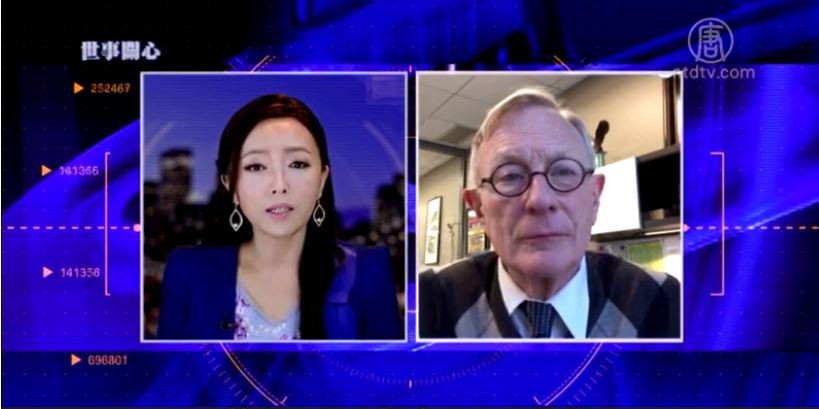
|
January 30, 2018
NTD Interview
|
|
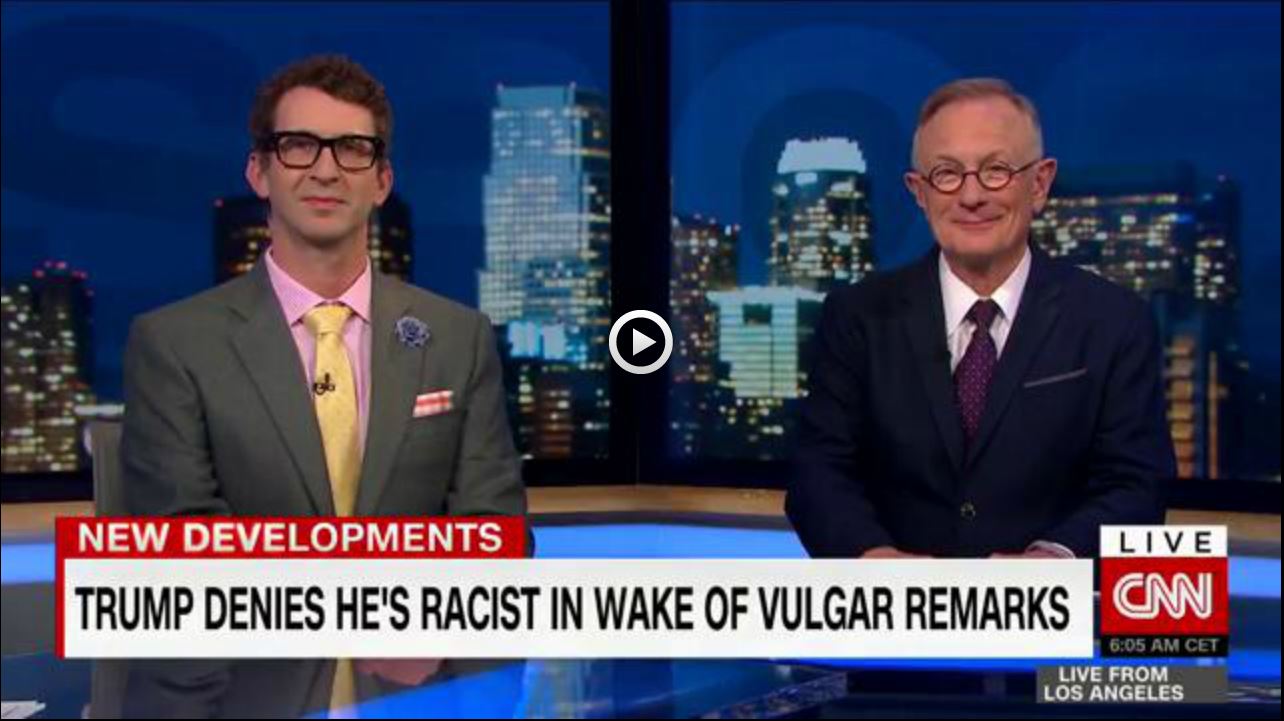
|
January 16, 2018
CNN Interview - Part 1
|

|
January 16, 2018
CNN Interview - Part 2
|
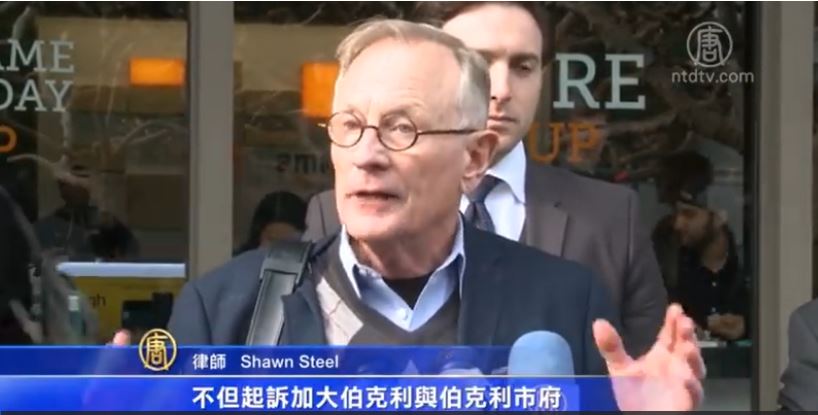
|
January 16, 2018
Press Conference
|
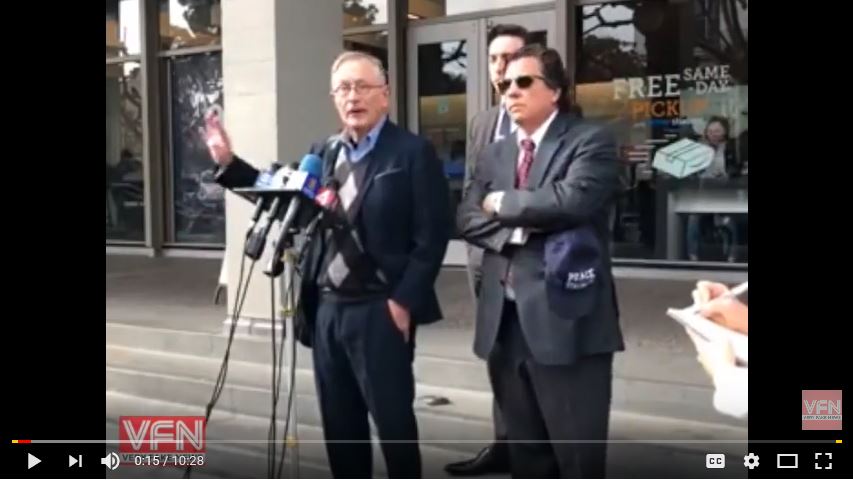
|
January 16, 2018
Press Conference
|

|
October 24, 2017
CNN Interview
|

|
October 18, 2017
CNN Interview
|
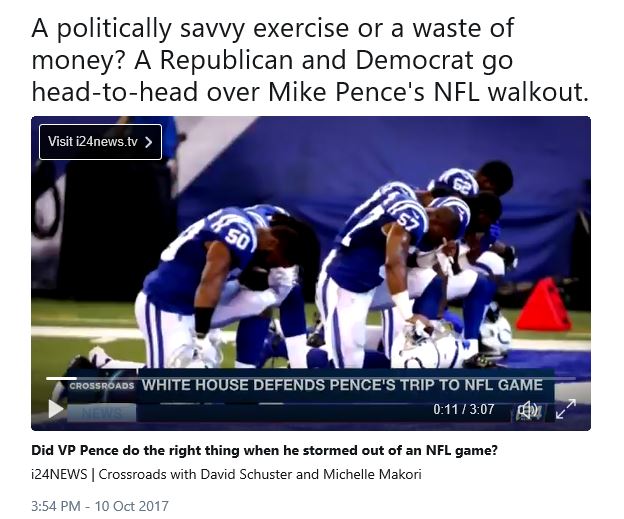
|
October 10, 2017
i24News Interview
|
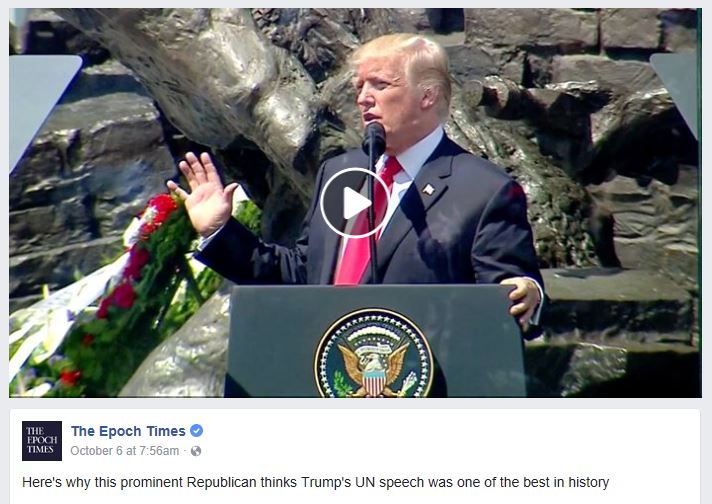
|
October 6, 2017
The Epoch Times Interview
|
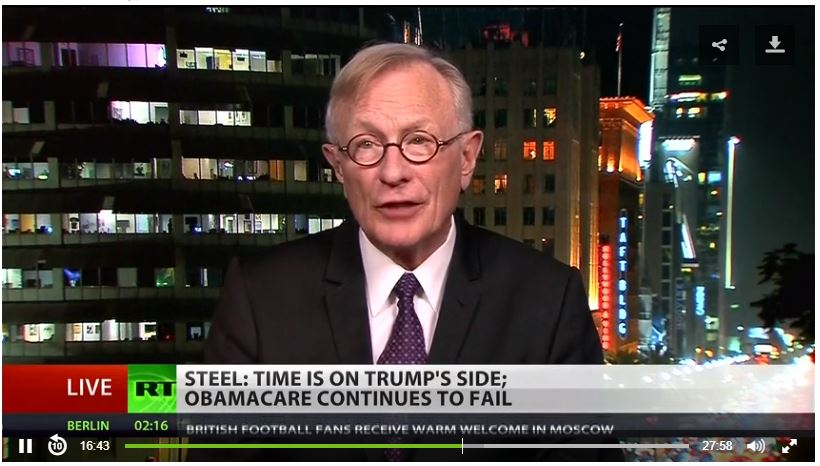
|
September 27, 2017
RT America Interview
|
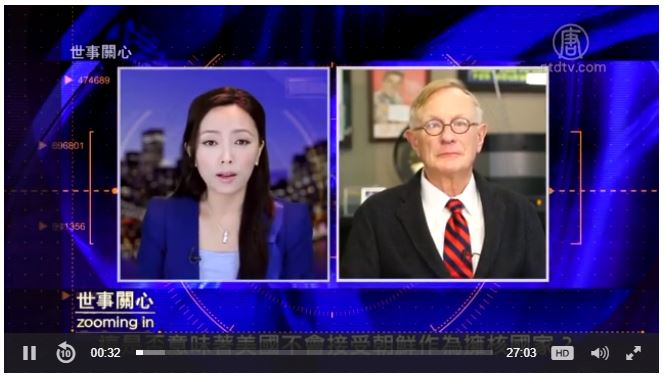
|
September 26, 2017
NTD Interview
|
|
|
|
|
|
|
|

State Republicans See Light in 2006
November 08, 2002
While the midterm election was a national triumph for the Republican Party, in California it played out as a tragedy. Bill Simon lost the opportunity to defeat one of the most unpopular governors in state history, and the Democrats swept all statewide offices (except in the still too-close-to-call controller's race).
It's important to put the results in perspective. The massive Democratic campaign war chests in California dwarfed those of their Republican opponents. Only the Simon campaign amassed a significant treasury to sustain an effective TV campaign in the final weeks. Consequently, voters were drenched with Democrat ads but just lightly spritzed with Republican spots.
Given that disparity, the narrowness of the Democrat margin in most of the statewide partisan races is astonishing. Only Atty. Gen. Bill Lockyer broke 50%.
Gov. Gray Davis himself can take cold comfort from his win. His $70-million campaign netted him just 47% of the vote -- less than he received in 1998 and only five points ahead of Simon. Further, he remains deeply unpopular, a termed-out lame duck who faces a hostile Democratic Legislature and statewide officials with no loyalty to him.
Clearly, the Democratic sweep occurred primarily because of the fund-raising advantage, not the fantasy advanced by liberal pundits that California has morphed into a Democratic bastion. It's also worth noting that, despite being massively outspent, Republicans gained a state Senate seat and two Assembly seats, and they may yet pick up a third.
The usual suspects in the media and the Republican Party are resuscitating an equally false notion that Simon lost because he was "too conservative" for California. It's a variation on the canard that the Republican Party must move left to be viable in California -- a nostrum dispelled by looking at the election results.
For example, take the fates of Bruce McPherson and Tom McClintock, the most liberal and most conservative members, respectively, of the GOP ticket. McPherson perfectly fits the theoretical profile of the ideal GOP statewide candidate: pro-choice, strong moderate credentials, fawning press coverage, a comparably well-funded campaign and a compelling personal story. Yet he lost to gaffe-prone Lt. Gov. Cruz Bustamante by nine points. In stark contrast, the conservative McClintock, the GOP's nominee for controller, received more votes than any other statewide Republican candidate -- and may yet eke out a victory despite having been vastly outspent by the multimillionaire entrepreneur Steve Westly, whose ads attacking McClintock's pro-life stance had little effect.
Republicans have reason to be hopeful. The relatively strong showing by GOP candidates will lead President Bush to vigorously contest California, and the surprising GOP gains in Congress are a testament to his campaign prowess. Several U.S. representatives who would make attractive candidates are seriously considering challenging U.S. Sen. Barbara Boxer in her bid for a third term in 2004, and an active Bush campaign would be a huge boost to whoever wins the nomination. Beyond that, 2006 offers the prospect of the governorship and half the constitutional offices opening up because of term limits.
At the same time, Republicans must mount a credible ground game if they are to prevail. While the Democrats deploy an army of thousands of paid workers every election, Republicans respond with just a few platoons. Fielding a comparable force would be very expensive, but the price is well worth the extra three to five points in the polls it would produce.
Four years is a long time in politics. California Democrats were prostrate in 1994 and triumphant in 1998. The pendulum can easily swing back in the GOP's direction, especially with a popular president giving it a push.

Getting Ready For the Final Push
October 01, 2002
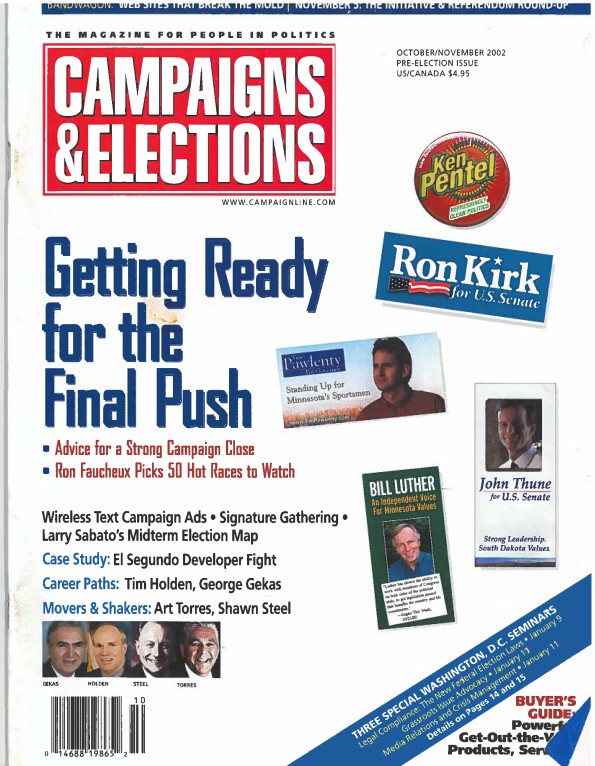

Movers & Shakers, Art Torres
October 01, 2002
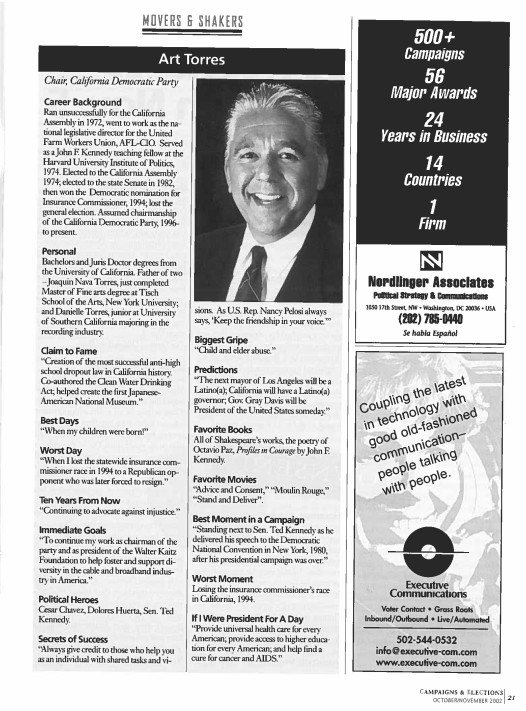

Don't Snicker ... Bill Simon Could Actually Win
September 22, 2002
I predict Bill Simon Jr. will defeat Gray Davis. Such a statement crashes, Scud-like, directly into the bunker of California's chattering-class consensus, and the reader may understandably be tempted to dismiss it as blind partisan cheerleading or just plain contrariness.
But I think Simon will win based on empirical indicators, not just partisan hopes. Granted, the Simon campaign thus far has not been a case study in effectiveness, but the fact that his candidacy has been administered the last rites almost daily for months, while rudely refusing to die, counterintuitively suggests Simon will trump the media prognosticators and win.
Simon has been hammered by a nonstop torrent of negative media coverage and TV attack ads since the spring. Richard Riordan's once-formidable candidacy--also characterized as confused and badly run--imploded under a less severe and sustained pounding. Yet amazingly, in poll after poll, Simon remains well within striking distance of Davis.
A Field Poll survey released in July had Simon down just seven points. Two months later, following Simon's worst month mediawise, he was still seven points behind Davis. This defies the conventional rules of politics and is a tribute to Davis' deep, persistent weakness--a story the media neglect in their obsession with the Simon campaign's real and imagined missteps.
Davis' unpopularity is no mystery. He inherited a booming economy and overflowing state coffers, which he has mismanaged into a sluggish economy and a $24-billion deficit. He failed to deal with the electricity crisis everyone else saw coming, acting when it was too late by signing panicky contracts locking us into historically high electricity rates and burdening us with billions in debt. Policymaking has become a political Ebay for special interests that secure favorable decisions that are not so coincidentally timed to large campaign contributions.
The imperious, intemperate Davis is simply disliked by Californians--Democrats as well as Republicans and independents. Davis is banking on the mountain of campaign cash he has squeezed from every special interest to insulate him from all that and buy him a second term. But in politics, as in life, money isn't everything--a lesson Davis imparted to "Checkbook" Al Checchi and Jane Harman in 1998.
Since spring, Davis has spent millions attacking Simon on television, with relatively little impact on Simon's popularity. He's also spent millions on ads talking about what a great governor he is, and his popularity rating is worse than ever.
Voters want an alternative to Davis. They overwhelmingly believe the state is heading in the wrong direction, and they have no reason to think Davis can or will turn things around.
Meanwhile, events have provided Simon with a fresh start as the campaign enters its critical final phase.
The groundless fraud verdict--which had been hanging over Simon's campaign like a nightmare--has been tossed out, depriving Davis of one of his principal clubs for pummeling Simon.
Simon's campaign has finally made full disclosure of the candidate's tax returns, putting another distraction behind it. These developments, combined with Simon's decision to pour $4 million of his own money into the campaign, will boost fund-raising and ensure that his campaign can fund a sustained ad campaign in the final weeks.
And it is those final weeks, when voters will really begin focusing on the race, that matter most. If Simon can stay on the offensive and relentlessly remind voters of Davis' miserable record and the worsened condition of the state, he will close the gap and win in November.
Many an overconfident incumbent has fumbled away victory to a lean and hungry challenger. Davis knows this from his own experience, having defied the predictions of pundits to beat two vastly better-funded primary opponents and then defeat a much better-funded Dan Lungren. I'm sure the governor is hoping history doesn't repeat itself.

'Same-Day Voting' Makes Hanging Chads Look Quaint
July 29, 2002
If you use your credit card at almost any retailer, you'll be asked for valid ID as a fraud prevention measure. Imagine a cashier's reaction if, instead of a driver's license, you handed over a preprinted bank deposit slip and a pre- approved credit card application you had received in the mail.
While that may not be good enough for Target, backers of the "same-day-voting" initiative on November's ballot think it's more than enough identification in order to register and cast a ballot after walking up to a polling place on election day.
That's right, this "reform" would allow Californians to register on election day and vote after showing "proof" of identity by using one of a laundry list of various items considered to be sufficient proof of residence. They also could register by going to their county registrar's office during the 28 days before an election.
The initiative's proclaimed intent is to increase voter turnout. This seemingly innocuous measure appeals to our desire to maximize participation in our representative system of government. After all, it's easy to imagine something like an untimely relocation causing a person to fall through the cracks and be ineligible to vote.
However, closer examination of the initiative makes it plain that it would become easier to commit voter fraud and harder to investigate such misdeeds and that an already complicated voting system would become even more complex and unwieldy.
Take, for example, what will be considered valid identification if this initiative passes: utility bills, credit card bills, bank statements, preprinted checks or bank deposit slips, a vehicle registration and "mail addressed to the voter at his or her current residence address." About the only thing missing is a note from your mother.
Initiative proponents contend this would actually reduce voter fraud because there currently is no ID requirement that Californians must meet in order to register and vote.
Far more likely would be organized voter fraud by unscrupulous campaigns exploiting this unbelievably permissive list.
Riverside County Registrar Mischelle Townsend says it would be extremely difficult to prevent fraud if this initiative passes. Now, if there's any question about your eligibility, you can cast a "provisional" ballot, which is set aside and counted last, after its validity has been ascertained. The same-day-voting initiative would abolish provisional ballots, thereby eliminating the main avenue for investigating voter fraud even as it multiplies opportunities to commit fraud.
If this initiative passes, you can count on vanloads of warm bodies armed with utility bills rolling up to polling locations in closely contested legislative and congressional districts, where a little fraud can go a long way toward deciding the outcome of a race. The initiative also requires county registrars to station a worker outside polling places. This would mean recruitment, training and pay for thousands of additional workers, an expensive and time-consuming order for officials already hard pressed to scratch up enough workers to discharge their current responsibilities.
Small wonder that the registrars of some of the state's largest counties think the same-day-voting initiative is a bad idea.
The measure's promise to increase voter turnout is also spurious.
Supporters say California voter turnout in November 2000 hit its lowest level since 1964, when our voting laws were certainly less flexible. Since then, we have enacted very liberal absentee voting laws and the "motor voter" program and shortened the registration blackout period to just 14 days before an election. You can even download voter registration forms from the Internet.
Voting has been made successively easier during the last two decades, yet turnout continues to decline. By what magic would this horribly flawed initiative reverse this sad trend? Clearly the cure to voter apathy lies elsewhere.
The right to vote is a precious franchise, but the same-day-voting initiative would only undermine it by creating new pathways to fraud and placing burdensome new mandates on already overwhelmed, underfunded county election officials.
The best way to increase turnout is to give voters candidates they can believe in and elected officials who respond to the will of the people rather than powerful special interests.

Lionesses of the Left Eat Judicial Nominees Alive
May 26, 2002
Bush administration officials are furious and frustrated with Senate Democrats for holding hostage dozens of qualified conservative judicial candidates by refusing to allow floor votes on their nominations. Meanwhile, back in California, Sens. Dianne Feinstein and Barbara Boxer, both Democrats, are squeezing the administration by threatening to blue-slip all the nominees who don't meet their political agenda. Even worse, they've been allowed to do this through a deal brokered by Republicans that was supposed to smooth the way for President Bush's judicial choices.
This untenable situation can partly be blamed on someone close to Bush: attorney Gerald L. Parsky, Bush's top political operative in California.
Shortly after Bush's inauguration, Parsky, who advises Bush on presidential appointments, convinced the newly installed White House counsel's office to gamble on a system of so-called bipartisan committees to screen judicial nominations.
The idea was to come up with federal district court candidates who were acceptable to both parties and thus ensure speedy confirmation by the nearly evenly divided Senate.
Historically, in a state like California where both U.S. senators are from the opposition party, the judicial selection process falls to senior Republican members of the House delegation.
Parsky's plan usurped that precious prerogative in favor of a bizarre system of committees--half of whose members are appointed by Feinstein and Boxer. Four committees, each made up of six members, evaluate candidates for the federal bench in sessions that are closed to public scrutiny. No judicial candidate is forwarded to the White House unless four of the six members agree, but this gives Feinstein and Boxer de facto veto power over anyone the White House wants to place on the bench.
Not surprisingly, speedy confirmations remain theoretical. The bipartisan panels have proved to be an abysmal failure.
For example, shortly after announcing formation of the panels last year, Bush nominated Rep. Christopher Cox (R-Newport Beach) and Superior Court Judge Carolyn Kuhl to the 9th Circuit Court of Appeals. Boxer, unrestrained by any sense of fairness you would think she might have--given her participation in the bipartisan panels--launched one of her trademark verbal tirades against Cox's nomination, which was withdrawn. Neither Boxer nor Feinstein has assisted Kuhl, whose nomination drifts in limbo as the wait for a hearing drags into its second year.
Feinstein has shown her true colors in two big votes involving judicial candidates from other states who didn't pass her ideological muster.
A couple of months ago, Feinstein, a member of the Senate Judiciary Committee, voted against allowing the full Senate to vote on Bush's nominee, Judge Charles Pickering. Last week, she did the same against Judge D. Brooks Smith. This is the same Feinstein who recently stated that Bush should not be free to choose his own nominees because of the narrowness of his election.
"There is no mandate, in my view, to skew the courts to the right," she was quoted as saying. "And so I think you're going to see a Judiciary Committee that's really going to be looking for mainstream judges."
"Mainstream judges" is a Democratic code phrase for traditional, big-government, anti-individual-freedom and anti-property-rights jurists. Let's face it, it is virtually guaranteed that no conservative scholars--no matter how highly qualified--can survive the Boxer-Feinstein gantlet.
The bipartisan committee process has been conducted like a modern-day Star Chamber, shrouded in secrecy. The lack of open and recorded hearings makes for great mischief. More than one judicial district judge candidate has told me of being asked to state a position on Roe vs. Wade. One told me he was asked about his involvement in the Catholic Church. These kinds of questions are clearly improper.
The rumblings over judicial selection are getting louder. Even Alberto Gonzalez, a close Bush advisor and White House counsel, expressed somber dissatisfaction last week with the Parsky-designed district committees.
The bipartisan committees are a half-baked idea that has served as a weapon for Boxer and Feinstein to prevent Bush from placing conservative judges on the federal bench. These two lionesses of the left have taken Parsky's naive creation and are using it to eat him--and the president's judicial appointment power--alive.
The only solution is to return to the time-honored tradition of entrusting the selection of federal judge candidates to senior federal elected members of the president's party. It is a proven system that works.
|
Articles
2025
2024
2023
2022
2021
2020
2019
2018
2017
2016
2015
2014
2013
2012
2011
2010
2009
2008
2007
2006
2005
2004
2003
2002
2000
1998
1996
|